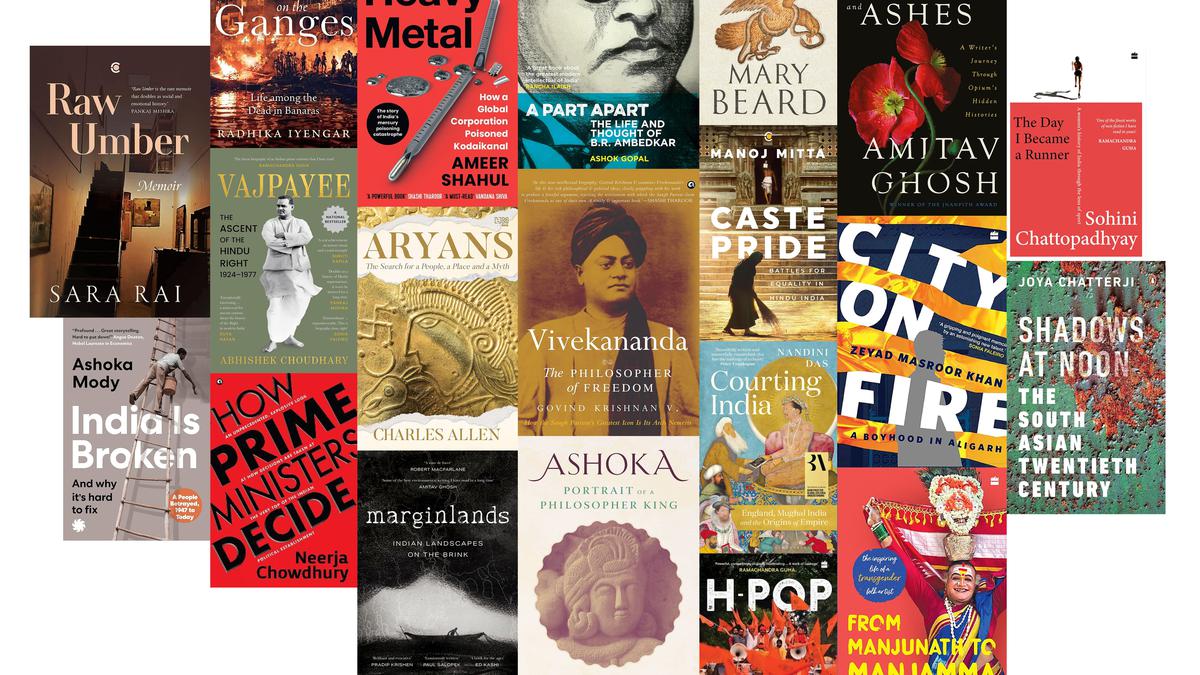
Best non-fiction of 2023
The Hindu
Best non-fiction books of 2023
The world is in turmoil politically and socially, with wars being waged on two fronts. The year saw extreme weather events with hurricanes, cyclones, too much heat, too much rain, making climate change a cause for anxiety. Not surprisingly, many of the non-fiction published this year looked into the chaos. A notable book of the year is Anuradha Bhasin’s A Dismantled State, which chronicles what happened in the Kashmir Valley after August 2019 when Articles 370 and 35A were revoked, and the State became a Union Territory. Published in late December 2022, it was read long into 2023. Other books delved into history, politics, the economy, and environment. There were several memoirs, some going over the top with promotions (Prince Harry’s Spare), others letting word-of-mouth do the talking (Sara Rai’s Raw Umber); and biographies from a series of readings on the constitutionalist, Ambedkar, to Walter Isaacson on Elon Musk. Here are the top 20 of the year.
1. India is Broken and Why It’s Hard to Fixby Ashoka Mody (Juggernaut): The veteran economist critiques contemporary India’s glaring inequalities by tracing the history of socio-economic misadventures since independence. In an interview to The Hindu, he said, “When social norms and public accountability erodes, policy has no meaning.” Pointing out that though liberalisation helped India to reduce poverty, the nature of the growth has not been all-encompassing — there are not enough jobs, or clean air and water, and zero accountability when execution falters.
2. Joya Chatterji’sShadows at Noon: The South Asian Twentieth Century (Penguin Viking) tells the “turbulent, rich and compelling” history of the region and how it informs the present. In the Introduction, she writes that unlike many other histories of the subcontinent that concentrate solely on politics, people are at the heart of her book, “in all their voluble and often violent relationships with one another.” The historian points at the ties that bind India, Pakistan and Bangladesh, “connected by a shared legacy of structures of rule. And a lot else – let’s call it history.”
3. In Marginlands(Pan Macmillan), Arati Kumar-Rao travels to the Thar desert, the mangrove forests in the Sunderbans, eroding coastlines and beaches of Mumbai and Kerala, to study India’s most endangered landscapes. With climate change a reality, Kumar-Rao listens to the people — and explains why misguided decisions have taken many ecologically fragile places to the brink. She has documented a rich monologue about the fate of India’s landscapes, coming away with the belief that “the ancient practice of listening to the land and doing right by it can yet be reclaimed.”
4. Emperor of Rome (Profile Books/Hachette) by Mary Beard shines a light on the emperors who ruled the Roman empire, from Julius Caesar to Alexander Severus. Sifting fact from fiction, and the tall stories of excess, intrigue and outright terror associated withseveral Roman emperors, herstudy maps the period from 44 BCE to 235 CE and chronicles the “malevolent chaos” that emperors, instinctively or deliberately, thrived on. And yes, there’s a chilling resonance with the modern day chaos.
5. City on Fire: A Boyhood in Aligarh (HarperCollins) by Zeyad Masroor Khan is a coming-of-age narrative about growing up in a ghetto where there were perpetual undercurrents of religious violence and an omnipresent fear that someone in the family may turn up dead. How did hate and “othering” become a part of everyday life? Is there a way out? Through his own experience, Khan, in his debut book, writes what it feels to be a Muslim in India today.
6. The figure of her grandfather, Premchand, naturally looms over Sara Rai’s Raw Umber: A Memoir (Westland Books), but her evocative autobiography is so much more and ‘The Ancestor in the Cupboard’ is just one part of it. Others in her family, grandmother, parents, aunts, uncles, cousins, were all writers and in her mind she saw them insisting that they be written about too. In doing this and writing her story as well, she brings alive an eclectic and syncretic past, showing readers a world — and a time — lost forever.

Creating the right talent and grounding key to attracting GCCs, says Minister Palanivel Thiaga Rajan
Tamil Nadu Minister emphasizes talent development for Global Capability Centres at GCC Coimbatore Summit 2025.

 Run 3 Space | Play Space Running Game
Run 3 Space | Play Space Running Game Traffic Jam 3D | Online Racing Game
Traffic Jam 3D | Online Racing Game Duck Hunt | Play Old Classic Game
Duck Hunt | Play Old Classic Game










